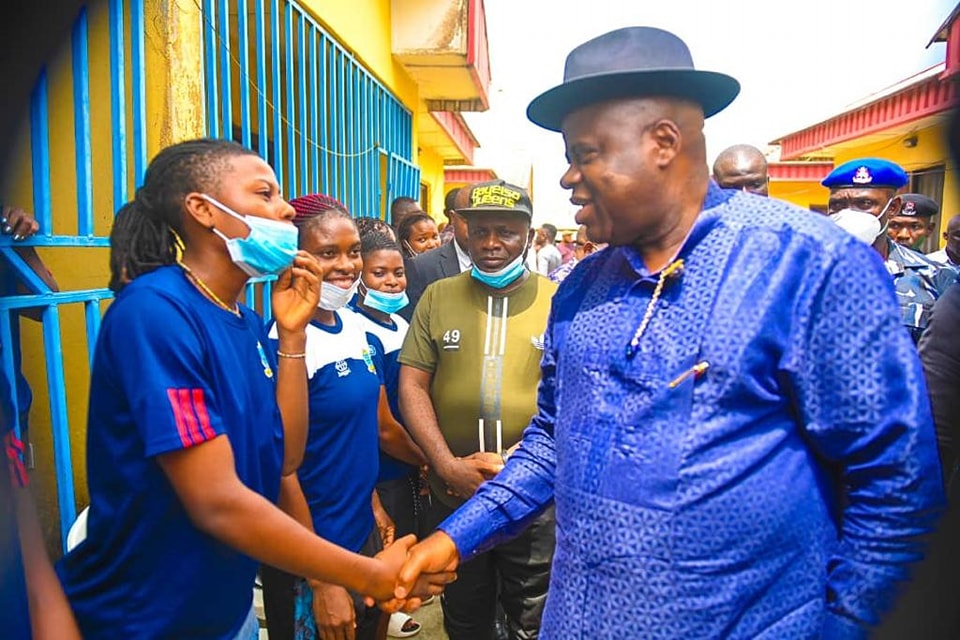Niger Delta
NAPTIP Wants Bayelsa’s Support In Fight Against Human Trafficking

The Benin Zonal Command of the National Agency for the Prohibition of Trafficking in Persons (NAPTIP) has solicited the support and collaboration of the Bayelsa State Government to fight against the trafficking of persons in the zone.
The zonal commander of NAPTIP, Barrister NdukaNwanwenne, made the request during a courtesy visit recently to the Deputy Governor of the the state, Senator Lawrence Ewhrudjakpo in Government House, Yenagoa.
Nwanwenne explained that the task of stamping out the menace of human trafficking in the zone, comprising Edo, Delta and Bayelsa States, requires the collaboration at different levels and agencies of government to be effective.
He said a lot of public awareness campaigns were needed in the various communities, as human traffickers entice unsuspecting young girls with fake promises of securing high-paying jobs in Europe and elsewhere, which only land victims in prostitution and sexual slavery.
The NAPTIP zonal commander pointed out that human trafficking in Nigeria had taken a new dimension, whereby vital body organs of victims are removed after killing them and exported to other countries.
He clarified that out of the three states that the zone was made up of only Bayelsa was yet to have its anti-human trafficking taskforce set up, informing that the Director General of the agency would in no distant time inaugurate the taskforce in the state.
Responding to the request for collaboration, the Deputy Governor said government was prepared to close ranks with NAPTIP to fight against human trafficking in the state
Ewhrudjakpo, who drew a close relationship between human trafficking and drug abuse, expressed concern that the present level of awareness campaigns on the menace of human trafficking was inadequate.
The Bayelsa number two man called on the NAPTIP to open offices in all the eight local governments areas of the state to effectively take the campaign to the grassroots, by involving religious and traditional leaders, public and private schools, and other relevant institutions.
He said government would give all the necessary support to the anti-human trafficking agency in the task ahead, and called for all hands to be on deck.
In another development, the Deputy Governor of Bayelsa State, Senator Lawrence Ewhrudjakpo, has re-echoed his call on alumni associations to give back more to their alma maters.
Senator Ewhrudjakpo spoke when he received in audience a delegation from Government Secondary School, Odi Alumni Association at his office in Yenagoa.
According to him, the role of old students contributing to the development of their alma mater is key and therefore urged members to regularly present themselves as role models to motivate young learners in schools.
The Deputy Governor who asserted that there is virtually no school in the state, which does not have the challenge of cultism and drug abuse, encouraged GSS Odi Alumni to do more in the area of instilling discipline, learning morality.
He however congratulated GSS Odi for producing great and outstanding personalities in different fields of endeavour, including the incumbent Governor of Bayelsa State, Senator DouyeDiri.
In his presentation, the Chairman of GSS Odi Alumni Association, Professor EtebuEbimieowei, disclosed that the alumni had put together a programme to celebrate the 50th anniversary of the school.
Etebu, who on behalf of the alumni formally invited the Deputy Governor to be part of the celebration, said activities lined up include road march, symposium, novelty football match, as well as gala and award night.
By: AriweraIbibo-Howells, Yenagoa
Niger Delta
NDDC Tasks Communities On Infrastructure Protection, Synergy … As Okpebholo, Snate HostComm Chair Praises NDDC’S Performance
Niger Delta
Delta Among 4th Largest Economy in Nigeria – SSG
Niger Delta
World Water Day: Aging Facility, Bane Of C’River Water Board – Commissioner
-
Nation5 days ago
HYPREP Inducts 100 Ogoni Youths For Seafaring Training
-
World5 days ago
UN marks 50 years of Biological Weapons Convention
-
Politics5 days ago
Reps Withdraw Decision On Bill Against Immunity For VP, Govs, Dep Govs
-
Niger Delta5 days ago
NDDC Tasks Communities On Infrastructure Protection, Synergy … As Okpebholo, Snate HostComm Chair Praises NDDC’S Performance
-
Politics5 days ago
Reps Seeks To Retain Immunity For President Only
-
Nation5 days ago
Northern Youth Council Rejects Proposed Bill For 37 New LGAs In Lagos
-
News5 days ago
Senate Urges Communications Ministry To Review Data Costs
-
Politics5 days ago
Remain Steadfast, Peaceful, Group Tasks Women Over Rivers Crisis

